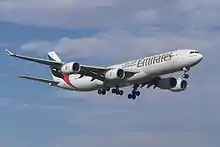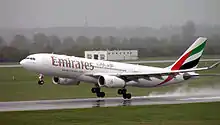Emirates business model
The so-called "Emirates business model" is the business model that lies at the heart of Emirates's commercial success.[1] Its main ingredients are a lean workforce comparable to a low-cost carrier and a flat organisational structure that allows the airline to maintain low overhead costs.[2]

Some industry analysts believe the airline is second only to Ryanair on a cash cost per seat basis due to lower operating costs at its Dubai base.[2] This enables it to serve secondary destinations profitably by connecting these via its global hub in Dubai.[3][4]
Emirates has not joined any global airline alliance (although they planned to join Star Alliance in 2000, they remained independent), stating that unless an airline is the lead participant in such an alliance – e.g. Lufthansa in the Star Alliance or Air France in SkyTeam – individual alliance members' freedom of action is compromised by the imposition of common alliance goals that mainly serve the interests of the alliance leaders.[5][6]
Since 1995, Emirates had operated an all-widebody fleet, largely composed of Airbus A380s and Boeing 777s. This results in lower unit costs compared to other large airlines operating a mix of narrow- and widebody fleets and allows the airline to use the aircraft's cargo capacity to increase its revenues and total profits. Since Dubai International Airport does not have any night flying restrictions, Emirates achieves a higher utilisation of its aircraft than competitors. It also has lower staff costs than longer established rivals, because in Dubai there are no unions and there is an abundance of cheap labour from India and Pakistan.[2]
Accusations of unfair competition

The established network carriers in Europe, North America and Australasia, i.e. Air France–KLM, Lufthansa, British Airways, Air Canada, Delta Air Lines, American Airlines, Qantas and Air New Zealand, perceive Emirates' strategic decision to reposition itself as a global carrier as a major threat because it allows air travellers to bypass traditional airline hubs such as London–Heathrow, Paris–Charles-de-Gaulle, Frankfurt and Amsterdam Schiphol on their way between Europe/North America and Asia/Australia by changing flights at Dubai instead.
Some of these carriers, notably Air France, Delta, and Qantas, have accused Emirates of receiving hidden state subsidies and of maintaining too cozy a relationship with Dubai's airport authority and its aviation authority, both of which are also wholly state-owned entities that share the same government owner with the airline. They also allege that Emirates is able to reduce its borrowing costs below market rates by taking advantage of its government shareholders' sovereign borrower status. They claim that this government support cross-subsidises the airline, masking its true financial performance.[1][7][8][9]
Fuel subsidies
Many airlines have accused Emirates of receiving fuel subsidies from the Government of Dubai. The airline has denied these accusations, stating that it purchases its fuel at the same price, as well as on the same terms and conditions, as every other commercial airline at all airports at which it operates. In FY 2007/08, fuel accounted for more than 30% of Emirates total expenditure, comparable with other international long-haul carriers such as British Airways, Lufthansa, Qantas or Singapore Airlines.[10]
Airport user charges
Emirates has also defended itself against competitor accusations claiming it pays discounted airport user charges at its home base. The airline rejected these claims, stating that it paid the same user charges at Dubai as everyone else, which were similar to those prevailing at other comparable airports in the region, including Abu Dhabi, Doha, and Bahrain.[10][11]
Local taxes
Many airlines have accused Emirates of having an unfair advantage, since it does not have to pay local taxes. The airline rejects these claims as misleading by clarifying that in the absence of income or corporate taxes in the UAE all airlines operating to and from Dubai benefit from this tax-free environment. In this context, Emirates also stresses that it has paid the Government of Dubai dividends to the tune of US$776 million, in return for US$10 million in seed capital gifted to the airline at its inception in 1985.[10][12]
Fifth freedom traffic
Emirates robustly defends itself against recurring claims accusing it of stealing other airlines' transfer passengers. It points out that its detractors have carried international passenger traffic between different third country points on their networks via their hub airports for decades, and that Emirates is entitled to do the same. Emirates furthermore points out that this enables it to offer regional passengers based in or near important secondary cities such as Glasgow, Newcastle, Düsseldorf, Hamburg, Nice, Venice, Brisbane or Perth convenient, worldwide one-stop connections via its global hub in Dubai.[13][14]
Relationship between Emirates and the Government of Dubai
Emirates has countered rivals' frequent accusations that its ownership by the Government of Dubai amounted to a direct subsidy, representing an unfair competitive advantage not enjoyed by most other airlines, by stating that it was a fully fledged commercial enterprise run at arm's length from the Dubai government, despite being wholly owned by it.[9]
Labour cost advantages
Some airlines have claimed that being based in Dubai gives Emirates an unfair labour cost advantage over other airlines. Emirates has countered this by stating that it faces the same costs to attract and retain staff recruited from around the world on expatriate terms and conditions as other airlines. The airline points out that the total cost of expatriate employee benefits amounts to more than US$400 million per annum.[15]
Canadian expansion

Emirates started flying to Canada on 29 October 2007, operating three weekly non-stop services on the Dubai–Toronto route.[16]
Emirates has experienced very high capacity factors on its Canadian services, averaging 90% since the start of operations between Toronto and Dubai. This has already resulted in substitution of an Airbus A380-800 "superjumbo" for the smaller Boeing 777-300ER widebody originally used on this route. However, the current bilateral agreement between the UAE and Canada restricts Emirates to only three flights per week between Dubai and Canada. In addition to operating daily between Dubai and Toronto to give business and leisure passengers greater flexibility, the airline would like to add Calgary, Montreal and Vancouver to its UAE–Canada schedule.[17] The Canadian Government has stated it does not see the need for more services in response to these requests.[18]
The Canadian Government has claimed that Air Canada might be adversely affected by increased competition from Emirates and that this could undermine its viability.[19][20] Emirates has refuted these claims, stating that there was no direct competitive overlap between it and Air Canada, since the latter (before 2015) did not operate services to the UAE or to any points in the Middle East, Africa or the Indian subcontinent, places where Emirates' flights are always busy. Emirates also stated that this would benefit Air Canada as many of Emirates' Canadian passengers were transferring to/from points on Air Canada's extensive North American network through its Toronto hub.[21]
In 2022, Air Canada and Emirates announced a strategic partnership, involving code-share routes and reciprocal frequent-flyer benefits and lounge access. Consequently, Air Canada announced a four-times weekly Vancouver--Dubai route and Emirates starting in October 2023[22] while Emirates announced a daily Montreal--Dubai route starting in July 2023.[23]
German expansion

Emirates commenced flights to Germany in July 1987 with the launch of scheduled services on the Dubai–Frankfurt route. As of 2009, Emirates operates 49 weekly passenger flights from Dubai to Germany, serving Frankfurt, Munich, Düsseldorf and Hamburg. Emirates also operates eleven weekly all-cargo flights from Dubai to Germany.[24] Germany is Emirates' second-biggest market in Europe (after the United Kingdom), carrying over one million passengers between Dubai and Germany during the 2007/08 financial year.[25]
Ever since 2007, Emirates wanted to fly to additional German cities, specifically Berlin and Stuttgart.[26][27][28]
In March 2009, Lufthansa said that it saw a competitive imbalance between Emirates and itself in the Germany–Dubai air travel market, effectively accusing the UAE carrier of stealing its transfer passengers between North America, the Middle East, Africa, India and the Far East. It also alleged that there were material differences in handling fees at Dubai Airport and unequal opportunities for the two airlines in each other's home markets. The latter relates to Emirates' heavy reliance on so-called "sixth freedom" traffic rights that enable it to carry passengers, cargo and mail between Germany and third countries via its hub in Dubai to fill most of the space on its Germany–Dubai flights, as a result of there being insufficient origin and destination traffic.[29][30]
Emirates has countered Lufthansa's claims by pointing out that its proposed German expansion would result in a "win-win" situation for both sides that would actually grow the German economy through additional economic activity generated, as a result of stimulating the air transport market between the two countries.[31]
An order of Germany's Federal Office for Goods Transport to Emirates to desist from price leadership on routes leaving Germany for non–European-Union (EU) destinations and forcing it to raise relevant business class fares by up to 20% has been the focus of the latest disagreement between the UAE carrier on one hand and the German government and Lufthansa on the other. Despite the Federal Office for Goods Transport's insistence that it has not singled out Emirates unfairly by demanding similar remedial action of other airlines regarding fares charged on non-EU routes out of Germany, Andrew Parker, Emirates' senior vice-president, denied any knowledge of this being the case. He termed the German Federal Office for Goods Transport's decision "anti-consumer" and "commercially nonsensical". He also threatened to seek redress from the European Commission.[32][33][34]
See also
References
- Rise of the Emirates Empire CNN Money, 1 October 2005
- The Economist (Easy Oz – Emirates, Low cost is coming to long haul flights, next could be low fares), pp. 82/3, The Economist Newspaper Ltd., London, 29 October 2005
- The Economist (Flights of fancy), www.economist.com, 5 October 2006
- Tim Clark, President, Emirates Airline: Speech to the European Aviation Club, 12 November 2009, p. 11
- Emirates.com
- Tim Clark, President, Emirates Airline: Speech to the European Aviation Club, 12 November 2009, pp. 12–15
- Emirates Accused of Unfair Practices
- Financial Times (Row erupts between Qantas and Emirates), UK Edition, London, 9 November 2005
- Tim Clark, President, Emirates Airline: Speech to the European Aviation Club, 12 November 2009, pp. 5–7
- Tim Clark, President, Emirates Airline: Speech to the European Aviation Club, 12 November 2009, p. 7
- Guardian.co.uk
- Knowledge.wharton.upenn.edu
- Meed.com
- Tim Clark, President, Emirates Airline: Speech to the European Aviation Club, 12 November 2009, pp. 4, 11
- Emirates.com
- Reuters.com
- "Air Canada proposed Emirates deal in 2006: documents". The Globe and Mail. 13 January 2011. Retrieved 18 May 2023.
- Theglobeandmail.com
- Theglobeandmail.com
- Tim Clark, President, Emirates Airline: Speech to the European Aviation Club, 12 November 2009, p. 14
- Emirates.com
- "Marhaba! Air Canada to Launch New Vancouver-Dubai Service". Air Canada. Retrieved 18 May 2023.
- "Emirates to expand global network with launch of services to Montréal in July". Emirates. Retrieved 18 May 2023.
- Scoop.co.nz
- Emirates.com
- Travelindustrydeals.com
- Gerson Lehrman Group – Intelligently Connecting Institutions and Expertise. Energy & Industrials: A test case for Germany pits consumer interests against EC airlines
- Breaking travel news [!BTN – Emirates may be capped to protect Lufthansa, 27 July 2007
- Airflights.to
- Thenational.ae
- Emirates.com
- Business & Leadership, Leadership: Germany forces Emirates to raise business fares, 20.11.2009
- AIRwise (Hub Page > Airwise News > Airline News > Germany tells non-EU airlines to raise prices, 19 November 2009)
- Tim Clark, President, Emirates Airline: Speech to the European Aviation Club, 12 November 2009, pp. 15/6